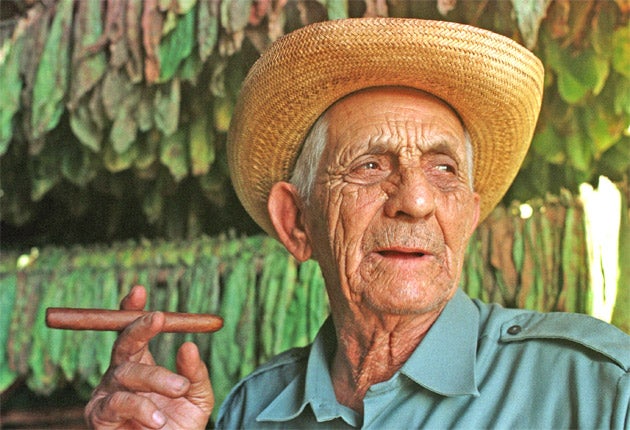Alejandro Robaina: Tobacco farmer regarded as the godfather of the Cuban cigar industry

Your support helps us to tell the story
From reproductive rights to climate change to Big Tech, The Independent is on the ground when the story is developing. Whether it's investigating the financials of Elon Musk's pro-Trump PAC or producing our latest documentary, 'The A Word', which shines a light on the American women fighting for reproductive rights, we know how important it is to parse out the facts from the messaging.
At such a critical moment in US history, we need reporters on the ground. Your donation allows us to keep sending journalists to speak to both sides of the story.
The Independent is trusted by Americans across the entire political spectrum. And unlike many other quality news outlets, we choose not to lock Americans out of our reporting and analysis with paywalls. We believe quality journalism should be available to everyone, paid for by those who can afford it.
Your support makes all the difference.Alejandro Robaina, the "godfather" of the Cuban tobacco industry, was widely regarded as one of the finest cigar producers in the world. He started smoking at the age of 10, and eventually five cigars bore his family name – a unique distinction.
Robaina was born in 1919 in the small town of Alquizar, south-west of Havana. As a child he began working on the same 40 acres his grandfather had begun farming in 1845. Situated in Vuelta Abajo near Pinar del Rio, it is Cuba's most famous tobacco-growing region. Robaina, who was passionate about tobacco-growing, learned everything from his father, winner of the best tobacco producer award in 1952. At the age of 10, having helped his father to roll some cigars for their employees, Robaina kept one cigar and smoked it. He recalled that it made him feel "extremely drunk". Thereafter, he had a ritual four cigars a day.
When Fidel Castro overthrew the dictator Fulgencio Batista in 1959, he wanted to redistribute the land to peasants and the state in the form of state-run communes. The Robaina family and others in the tobacco-producing area refused, arguing that their families, with their generations of know-how and expertise, knew how best to cultivate and manage the land. Initially, the land was rented back to them. Now the majority of the Pinar del Rio tobacco plantations are run privately.
Having remained independent, Robaina continued to learn the art of growing the silken leaves to make the famous Habanos cigars. He explained that the leaves from his region did not taste like those grown in the rest of the country, nor like those from around the world. He became famous for producing top-quality tobacco with 80 per cent of his annual tobacco harvest being deemed fit for use as the outer wrapper leaf for Havana cigars, a role suitable for only the finest leaves, compared to 35 per cent from other plantations. Their quality could be appreciated in high-end cigars like Cohiba Espléndidos and Hoyo de Monterrey Double Coronas, renowned for their smoothness and richness.
With a growing reputation, Robaina became an unofficial ambassador for the cigar industry, travelling around the world to represent Cuba's most admired export. On one such trip he met King Juan Carlos of Spain and was asked for his autograph by the musician Sting. As age caught up with him, cigar lovers made the pilgrimage to his plantation in the hope of catching a glimpse of him and perhaps acquiring an autograph. Eventually, his grandson Hiroshi learnt the trade and began running the business.
Over the years Robaina received many accolades from Castro's government, once receiving a prized Russian Lada car. He joked, "it did cost me 12 pesos because I paid for the [number] plate." In the mid-1990s, when he was named the country's best tobacco grower, Castro again presented the award. In 1997, Habanos, a joint venture between the Cuban government and Britain's Imperial Tobacco Group, created Vegas Robaina, making him the only Cuban grower to have a brand of cigars named after him. In 2008, at the 10th Havana Cigar Festival of Cuba, which recognises world cigar makers, Robaina received the Special Havana Cigar Prize.
A box of his premium cigars can fetch more than $500 on the international market. One of his regrets was that due to the US trade embargo his cigars could not legally be sold in the world's biggest market.
Alejandro Robaina died at his home near San Luis. He once said that he wanted to live until he was 120 because "I have a big family, so many friends, and I want to see what they are going to be." He wanted to be remembered as "a humble farmer".
Martin Childs
Alejandro Robaina, tobacco farmer; born Alquízar, Pinar del Rio, Cuba 20 March 1919; married (four children); died San Luis, Pinar del Rio 17 April 2010.
Join our commenting forum
Join thought-provoking conversations, follow other Independent readers and see their replies
Comments